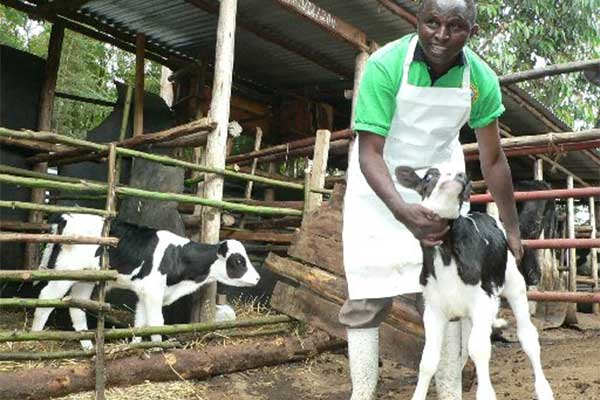
Infectious diseases
There are several bacterial, protozoan and viral diseases that affect the reproductive system and therefore result in infertility. These diseases include brucellosis, trichomoniasis, leptospirosis, bovine viral diarrhoea, campylobacteriosis/vibriosis among others we shall discuss in details only two which are of great importance not only to animals but can also be transmitted to human beings.
Brucellosis
This is a bacterial disease that affects man, domestic and wild animals (commonly known as undulating fever or bang disease in humans and animals respectively). Brucellosis is still prevalent in the tropics. It is a costly disease as it leads to infertility and culling. In cattle, it causes inflammation of the uterus and cervix and causes repeat breeding. The disease is commonly referred to as a professional hazard for farmers and veterinarians. Brucellosis is spread from vaginal discharge of infected cow or from aborted feotus. Breeding bulls can get or spread the disease during mating. In man, it is spread through oral ingestion of bacteria in milk of infected cow; the bacteria can also be transmitted through skin, wounds, mucus membranes of the eye, nose and teat opening in animals. In a pregnant cow, brucellosis causes abortion which characteristically occurs between 5th and 8th month. People who handle aborted feotus without proper protection or drink milk from infected cows can get infected. Sometimes the dead feotus can be retained in the womb and will be mummified or macerated. In cases where calves are born from infected mothers, they will be weak and prone to diarrhoea and will in most instances die at infancy. The aborting cows are sources of infection to other animals and man as they shade the infection into pastures, buildings and drinking water. The disease is diagnosed in cows using simple milk tests but has no treatment. The disease can only be prevented through vaccination, use of artificial insemination instead of bulls and screening of new animals to minimise introduction of the disease into farms.
Eradication can be achieved through a rigorous test and slaughter strategy/policy of infected cows. Countries that have eradicated the disease like Denmark, UK, Netherlands and Romania have employed this strategy. In humans, the disease is treatable but cases of misdiagnosis for malaria and typhoid are common.
Leptospirosis
Leptospirosis is a bacterial zoonotic disease which in animals is characterised by fever, red urine, mastitis and abortion. It is transmitted through contact with infected urine and affects the digestive and reproductive tracts. The common mode of transmission from cow to cow is through urine splashes; although transmission at mating has also been documented. Abortions occur in the last three months; the disease also causes retained after birth. Farmers get infected through urine splashes from infected cows for example during milking or by breathing in aerosol of urine droplets. Clinical signs in man include flu symptoms, muscle pain, headaches in some cases liver and kidney complications may follow. To control and prevent the disease vaccination can be done and observation of hygiene. The disease respondents well to streptomycin when diagnosed early.
Retained afterbirth
Feotal membranes are used to carry nutrients to the developing feotus in the womb. The membranes are normally expelled within 12 hours after birth. Retained afterbirth happens when the feotal membranes have not been released after 24 hours after delivery. Normally, a portion of the placenta will hang out and will be sucked into and out of the vulva and this is the genesis of infection as the contaminated stump continually spreads the micro-organisms into the uterus. Worst still, this can result in tetanus infection. These diseases are fatal if not timely and appropriately managed.Deficiencies of selenium, iodine, protein and carbohydrates, Vitamin A and E during pregnancy will predispose an animal to retained afterbirth. A cow with a retained afterbirth will have low appetite, reduced milk production. The condition delays service for up to six months or can even lead to sterility.





